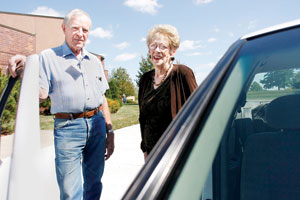 Transportation to and fro is one of the biggest frustrations facing older adults who want to continue living in their own homes. So three years ago Jewish Family Services began tackling the problem by creating JET Express.
Transportation to and fro is one of the biggest frustrations facing older adults who want to continue living in their own homes. So three years ago Jewish Family Services began tackling the problem by creating JET Express.
Dawn Herbet, JFS’s director of Older Adult Initiatives, explained that the JET Transportation Programs enable older adults age 65-plus, or those who have physical or mental disabilities, to stay active and independent, without driving their own car. The service is provided by volunteer drivers who use their own cars. It provides safe, personal, door-to-door transportation for such things as rides to the doctor, dentist, hairdresser, grocery store, volunteer commitments, synagogue or any activity keeping members active and independent.
“We can take them anywhere that helps keep them active and independent and lets them keep doing the things they want to do,” she said. The service costs $2.50 each way.
The program began, Herbet explained, because research showed that while there are transportation programs available in the city for people with lower incomes, there was still a gap in services.
“Those who had means were able to take cabs, but there was a need for those in the middle to afford a way to get to doctor’s appointments and food shopping and do the things that keep them active,” Herbet said.
Herbet said JFS learned about other volunteer driver programs in towns and determined it would be something that JFS could and should offer as well.
It doesn’t take much to qualify for the service. Other than age or disability, the only other qualification is that the person does not have transportation readily available. At this point, it is not able to accommodate anyone needing a wheelchair-accessible van.
“However, if any volunteer comes forth that has a wheelchair-accessible van, we would love to open up the service to those in wheelchairs. We can take those who are wheelchair-bound if they are able to transfer themselves in and out of the car,” Herbet said.
Currently 123 riders take advantage of JET Express. Sixty-five people make up the list of active drivers. JFS is currently recruiting more drivers.
“In order to meet the needs that we currently have, we desperately need more drivers,” Herbet said. “The demand is beyond the capabilities of what we can provide in certain months. Unfortunately there are times where we need to cancel because we don’t have the drivers and we truly want to help everyone get to where they want to go.”
In the past three years, Herbet said the amazing thing she has learned about the volunteer drivers is that they feel they are helping themselves as much as those who need the rides.
“They are forming relationships and feel good knowing they are creating a mitzvah and truly helping another human,” Herbet said.
Drivers need to be 21 years of age or older and have a clean driving record, along with a working car. They also need a valid driver’s license and personal car insurance. JFS provides secondary insurance on the drivers. Drivers are reimbursed 33 cents per mile.
“We do drug tests and we do background screens,” Herbet continued. “None of our drivers have ever had an accident in the two years we’ve been doing this program.”
Herbet said JET Express tries to make the program as convenient as possible for the drivers. Drivers can check the website anytime day or night and sign up for whatever times are convenient for them. They don’t have to commit to a certain amount of hours each week and they are free to take vacations or time off whenever necessary.
“We are truly thankful whether a driver can drive once a month or once a week to help older adults in our community,” she said.
Volunteer driver Jim Miller, who is not Jewish but thoroughly enjoys helping people in any way he can, said JET Express is very easy to deal with.
“They understand if I’ve got to take time to take care of things for myself,” he said.
A former employee of the Boy Scouts of America, Miller truly believes in the saying, “The service we give is the rent we pay for the space we occupy.”
Herbet said JET Express has gone beyond the expectations the social service agency had dreamed.
“We help people all the time get to where they want to go, but I think it’s more the personal stories, the friendships that have been formed and the care our drivers give our riders. That has certainly gone beyond the expectations we had. I had no idea the effect the drivers and the riders have had on each other,” Herbet said.
Barbara Steinberg used to drive herself everywhere, but mechanical troubles caused her to be without transportation. Now she loves JET Express.
“I called Jewish Family Services and all I can say is it gave me back my life. I was able to do things that I needed and wanted to do, like continuing to work in the Kehilath Israel Synagogue Sisterhood Gift Shop. I don’t know what I would have done without JET Express,” Steinberg said.
“The service has just been beyond my expectations. It’s been a pleasant surprise riding with those I know and I’ve become friends with ones I didn’t know. It’s been a lovely, lovely experience for me.”
JFS needs volunteers!
Adrienne Kizer, JFS’ director of volunteers and special projects, is spearheading an effort to recruit 50 volunteers for JFS’s older adult initiatives — JET Express and Help@Home — between now and the end of the year. She explained that both programs are designed to assist older adults with everyday things we may take for granted such as driving to a hair dresser, getting to the doctor’s office, hanging a picture, or setting up a new printer for our computer.
“As our community’s aging population continues to grow, our Help@Home and JET Express programs are called upon more than ever. To meet this growing demand and ensure our programs succeed in meeting the needs of our older adult population, JFS is looking to sign up 50 new volunteers by the end of 2011. Volunteering a couple of times a week, or even a few times a month, can mean the difference in helping older adults live independently in their own home and active in their community. And JFS volunteer programs are designed to make it convenient for everyone to volunteer — allowing you to schedule your volunteer time around your personal commitments,” Kizer said.
To learn more about volunteering for JFS, contact Adrienne Kizer at 913-327-8257 or .
Help@Home also enters third year
In addition to JET Express, JFS’s Help@Home project is also celebrating its third anniversary.
“We are up to 121 households serving more than 150 older adults and those who have physical or mental disabilities by providing minor home repairs, chore services, computer troubleshooting and annual home safety assessments. We’re available 24-7,” said Dawn Herbet, JFS’s director of Older Adult Initiatives.
JFS uses volunteers to supplement the work done by its “community handyman,” to do such things that they are comfortable doing such as changing light bulbs and computer troubleshooting. Participants in Help@Home are required to pay a fee that ranges from $7.50 to $79 to per month.
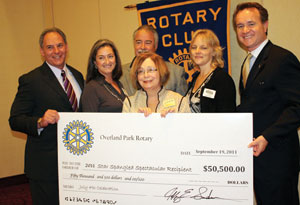 STAR SPANGLED FUNDRAISER — Lynn Intrator and Melynn Sight, members of the Star Spangled Spectacular committee, the fundraiser put on by the Overland Park Rotary Club on the 4th of July every year, sent us this photo of the check presentation. Last month the OP Rotary Club presented $55,500 to four local charities, representing the proceeds from the 20th annual event at Corporate Woods. The four charities included Down Syndrome Guild of Greater Kansas City, Head Start of Shawnee Mission, SAFEHOME and the club itself for its Tomorrow’s Leaders Today program.
STAR SPANGLED FUNDRAISER — Lynn Intrator and Melynn Sight, members of the Star Spangled Spectacular committee, the fundraiser put on by the Overland Park Rotary Club on the 4th of July every year, sent us this photo of the check presentation. Last month the OP Rotary Club presented $55,500 to four local charities, representing the proceeds from the 20th annual event at Corporate Woods. The four charities included Down Syndrome Guild of Greater Kansas City, Head Start of Shawnee Mission, SAFEHOME and the club itself for its Tomorrow’s Leaders Today program.



 Residents at Village Shalom like to say that something special happens there every day. Earlier this year, something truly remarkable took place that underscores not only the special nature of Village Shalom, but of the Kansas City Jewish community that supports it.
Residents at Village Shalom like to say that something special happens there every day. Earlier this year, something truly remarkable took place that underscores not only the special nature of Village Shalom, but of the Kansas City Jewish community that supports it.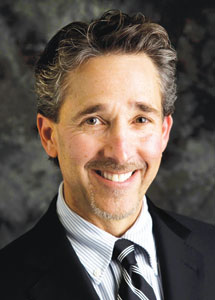 Village Shalom opened in June 2000 as an innovative retirement community offering a continuum of living options that enables residents to “age in place.” Its Overland Park campus consists of 64 independent-living villas; 54 assisted-living apartments; two 26-unit skilled-nursing floors providing both short-term rehabilitation and long-term care; and assisted living, skilled nursing and adult day programs for senior adults with memory loss and dementia-related illnesses. The facility also meets the needs of non-residential senior adults through its wellness center and outpatient therapy services. In addition, the facility provides more than $1.6 million annually in financial assistance to nearly one-third of its main-campus (assisted living and skilled nursing) residents who rely on Medicaid or other subsidy for their care.
Village Shalom opened in June 2000 as an innovative retirement community offering a continuum of living options that enables residents to “age in place.” Its Overland Park campus consists of 64 independent-living villas; 54 assisted-living apartments; two 26-unit skilled-nursing floors providing both short-term rehabilitation and long-term care; and assisted living, skilled nursing and adult day programs for senior adults with memory loss and dementia-related illnesses. The facility also meets the needs of non-residential senior adults through its wellness center and outpatient therapy services. In addition, the facility provides more than $1.6 million annually in financial assistance to nearly one-third of its main-campus (assisted living and skilled nursing) residents who rely on Medicaid or other subsidy for their care.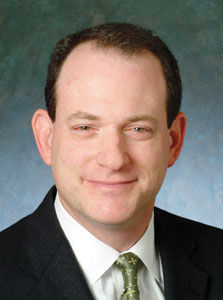 The magnitude of this figure led the debt-restructuring subcommittee to conclude that help must come from every possible avenue. It would require debt relief from the creditors of Village Shalom as well as contributions from the community in a variety of creatively conceived formats. Negotiations began with the largest creditor, a global bank, to write down a significant portion of their debt.
The magnitude of this figure led the debt-restructuring subcommittee to conclude that help must come from every possible avenue. It would require debt relief from the creditors of Village Shalom as well as contributions from the community in a variety of creatively conceived formats. Negotiations began with the largest creditor, a global bank, to write down a significant portion of their debt.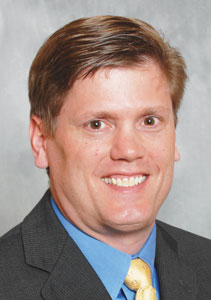 Lewis commented that the campaign’s success enables Village Shalom to look toward upcoming generations of senior adults: “We’re extremely proud of our past, and now the organization is in a position to think more strategically about our future as well. Many more people are living longer, and demographic trends ensure that the number of people needing long-term care will increase significantly. As the baby-boom generation ages, it will present the industry with formidable challenges, but also opportunities. We can now begin to envision the next phases of Village Shalom’s presence in meeting the changing needs of our community’s seniors.”
Lewis commented that the campaign’s success enables Village Shalom to look toward upcoming generations of senior adults: “We’re extremely proud of our past, and now the organization is in a position to think more strategically about our future as well. Many more people are living longer, and demographic trends ensure that the number of people needing long-term care will increase significantly. As the baby-boom generation ages, it will present the industry with formidable challenges, but also opportunities. We can now begin to envision the next phases of Village Shalom’s presence in meeting the changing needs of our community’s seniors.”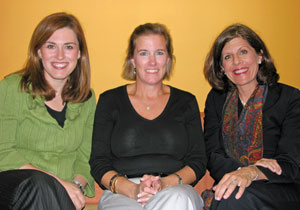 When it comes to finances, many women can say “We’ve come a long way, baby!” Today, regardless of whether a woman contributes to the family’s income, it’s common for both the husband and wife to make financial decisions together. Along those lines, many women now also have a larger say in how the family’s charitable dollars are spent as well.
When it comes to finances, many women can say “We’ve come a long way, baby!” Today, regardless of whether a woman contributes to the family’s income, it’s common for both the husband and wife to make financial decisions together. Along those lines, many women now also have a larger say in how the family’s charitable dollars are spent as well.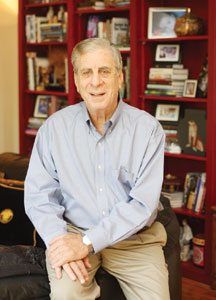 “Let’s go to Katz.”
“Let’s go to Katz.”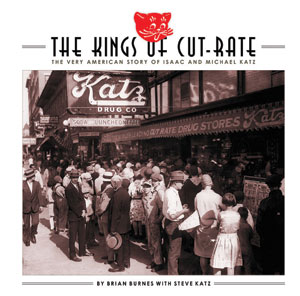 A book signing with Steve Katz and author Brian Burnes will be from 1:30 to 3:30 p.m. Saturday, Oct. 15, at The Kansas City Store, 312 Ward Parkway, on the Country Club Plaza. The pair will also launch the book with a discussion at 2 p.m. Oct. 30, at the Plaza Library. The library encourages those planning to attend to register at http://kclibrary.org under “Events.”
A book signing with Steve Katz and author Brian Burnes will be from 1:30 to 3:30 p.m. Saturday, Oct. 15, at The Kansas City Store, 312 Ward Parkway, on the Country Club Plaza. The pair will also launch the book with a discussion at 2 p.m. Oct. 30, at the Plaza Library. The library encourages those planning to attend to register at http://kclibrary.org under “Events.” It is indeed a Happy New Year for more than 60 people in the Jewish community who have been able to find jobs thanks, in part, to the efforts of Jewish Employment Services.
It is indeed a Happy New Year for more than 60 people in the Jewish community who have been able to find jobs thanks, in part, to the efforts of Jewish Employment Services.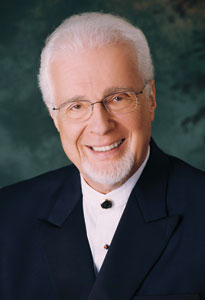 THE FOLLY PRESENTS PETER NERO — Grammy-Award winning pianist Peter Nero makes his Folly Jazz Series concert debut on Saturday, Nov. 5, featuring his unique crossover jazz interpretations of the Great American Songbook, including works by Leonard Bernstein and George Gershwin. With 68 recordings to his credit, Nero has recently been nominated for a Grammy Lifetime Achievement Award.
THE FOLLY PRESENTS PETER NERO — Grammy-Award winning pianist Peter Nero makes his Folly Jazz Series concert debut on Saturday, Nov. 5, featuring his unique crossover jazz interpretations of the Great American Songbook, including works by Leonard Bernstein and George Gershwin. With 68 recordings to his credit, Nero has recently been nominated for a Grammy Lifetime Achievement Award.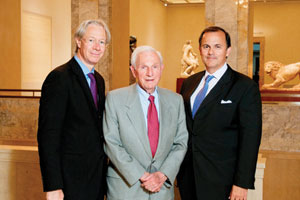
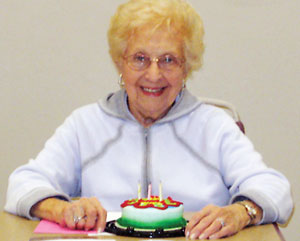
 Transportation to and fro is one of the biggest frustrations facing older adults who want to continue living in their own homes. So three years ago Jewish Family Services began tackling the problem by creating JET Express.
Transportation to and fro is one of the biggest frustrations facing older adults who want to continue living in their own homes. So three years ago Jewish Family Services began tackling the problem by creating JET Express. Marvin Hamlisch is a lucky man — and he tells you so.
Marvin Hamlisch is a lucky man — and he tells you so. SIGNS, SIGNS — Remember the song “Signs” by the Five Man Electrical Band. There’s a verse in it where the guy goes to a church and sees a sign that says “Everybody welcome. Come in, kneel down and pray.” When he doesn’t have any money to put in the collection plate, he writes his own note saying, “Thank you, Lord, for thinking about me, I’m alive and doing fine.” I thought of this, and chuckled, when I saw this photo of the sign posted outside at Congregation Ohev Sholom directing members of Ohev and Temple Israel to their respective locations for worship services on Rosh Hashanah. This sign is functional and a sign of our times, physically showing how the Jewish community is beginning to cooperate and collaborate. Right on!
SIGNS, SIGNS — Remember the song “Signs” by the Five Man Electrical Band. There’s a verse in it where the guy goes to a church and sees a sign that says “Everybody welcome. Come in, kneel down and pray.” When he doesn’t have any money to put in the collection plate, he writes his own note saying, “Thank you, Lord, for thinking about me, I’m alive and doing fine.” I thought of this, and chuckled, when I saw this photo of the sign posted outside at Congregation Ohev Sholom directing members of Ohev and Temple Israel to their respective locations for worship services on Rosh Hashanah. This sign is functional and a sign of our times, physically showing how the Jewish community is beginning to cooperate and collaborate. Right on!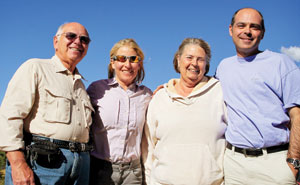 ROSH HASHANAH IN THE ROCKIES — For the second time Barbara and Chuck Gorodetzky of Congregation Kol Ami joined their son David on a Rosh Hashanah Retreat led by the Adventure Rabbi Jamie Korngold. David lives in Boulder, Colo., and serves on the Leadership Council of the Adventure Rabbi. The retreat was held at Snow Mountain near Winter Park, Colo. In another Kansas City connection, Rabbi Korngold grew up in New Jersey and was trained for her Bat Mitzvah by Cantor Paul Silbersher, who lived in New Jersey at the time.
ROSH HASHANAH IN THE ROCKIES — For the second time Barbara and Chuck Gorodetzky of Congregation Kol Ami joined their son David on a Rosh Hashanah Retreat led by the Adventure Rabbi Jamie Korngold. David lives in Boulder, Colo., and serves on the Leadership Council of the Adventure Rabbi. The retreat was held at Snow Mountain near Winter Park, Colo. In another Kansas City connection, Rabbi Korngold grew up in New Jersey and was trained for her Bat Mitzvah by Cantor Paul Silbersher, who lived in New Jersey at the time.